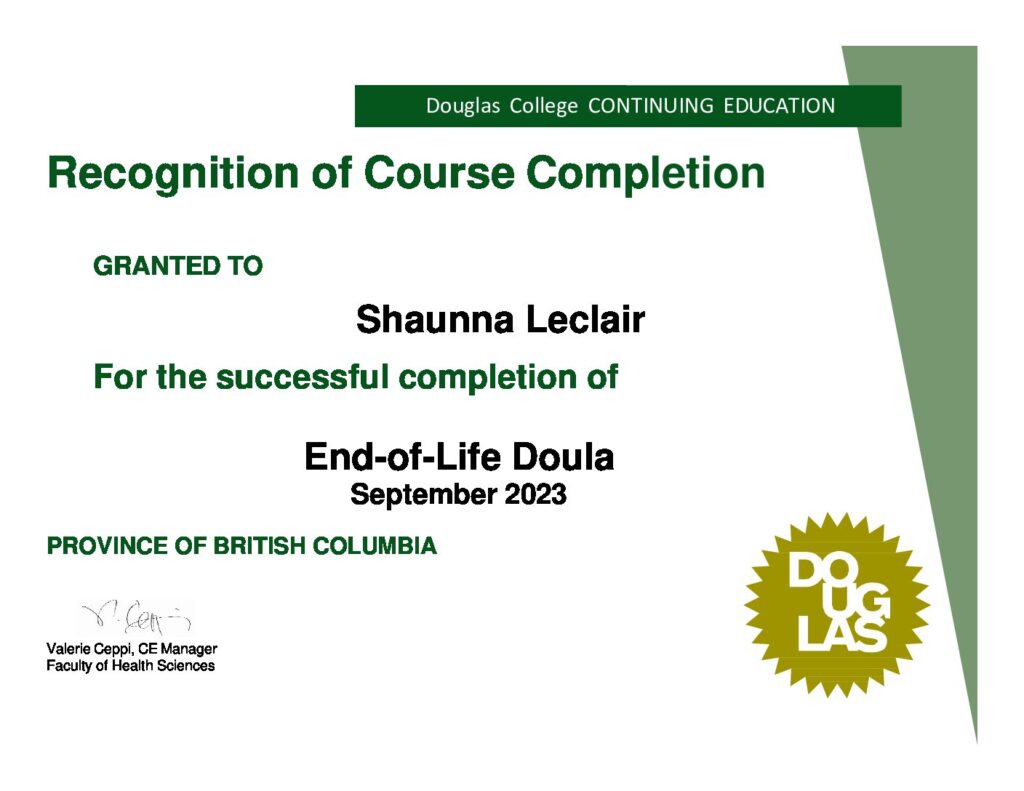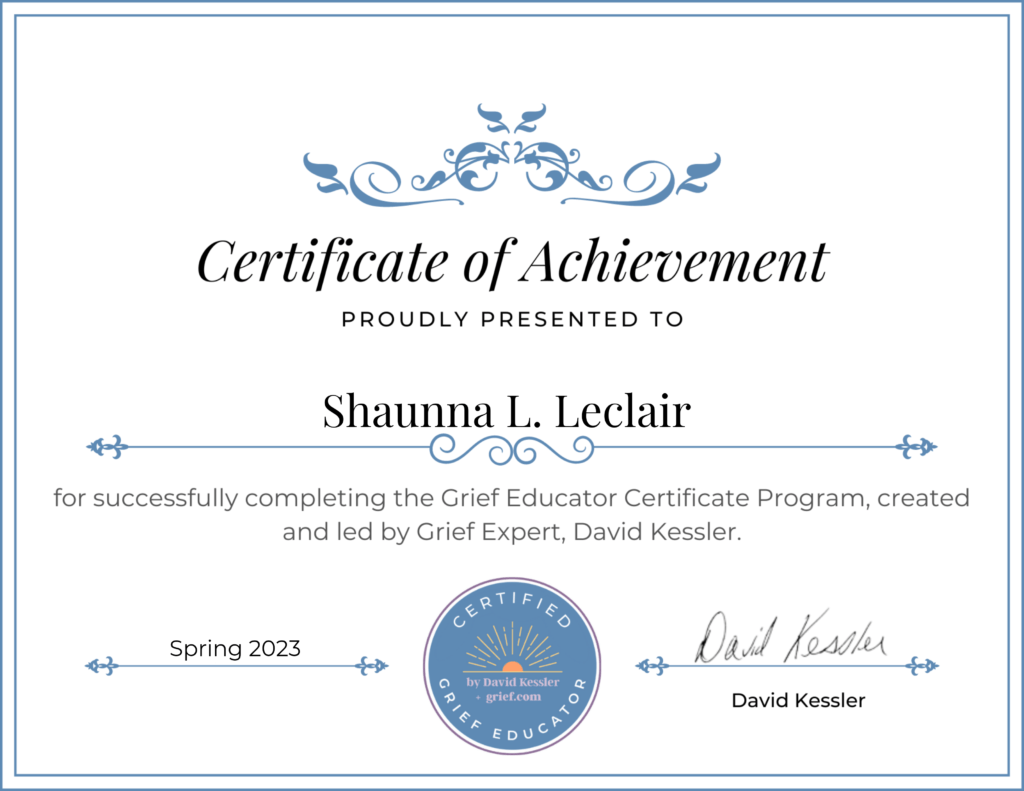An end-of-life doula is a non-medical professional who provides holistic support to individuals and their families during the dying process.
End-of-life doulas provide companionship, comfort, and guidance to those facing a terminal illness or death.
Who am I?

My name is Shaunna, and I am an End-of-Life Doula and a Grief Educator.
After my husband died, I wanted to learn more about it and how to support people facing the life/death transition.
That’s why I decided to become an end-of-life doula. An end-of-life doula is someone who provides non-medical, holistic, and compassionate care to people who are dying and their loved ones. They help with practical, emotional, spiritual, and legacy needs. They also assist with planning and facilitating a peaceful and meaningful death.
I trained with Douglas College, one of the leading organizations in this field. I learned about the stages of dying, the signs and symptoms of approaching death, the role of hospice and palliative care, the legal and ethical aspects of end-of-life care, and the skills and tools to offer comfort and support.
As an end-of-life doula, I also learned about the importance of self-care and boundaries. It is not an easy job, but it is gratifying. I feel honored and privileged to accompany people on their final journey and witness their transition.
Being an end-of-life doula has changed my life. It has made me more aware of my mortality and how I want to live and die. It has also deepened my connection with myself, others, and the universe. I am grateful for this opportunity to serve humanity in this way.

Grief Educator
A Grief Educator is a professional who helps people cope with loss and grief. They provide emotional support, education, and resources to individuals, families, and groups experiencing grief, trauma, or life transitions. A Grief Educator may work in various settings, such as hospices, hospitals, schools, community organizations, or private practice.
A Grief Educator’s role may include:
- Assessing the needs and goals of the clients
- Developing and implementing a personalized plan of care
- Providing counseling, coaching, or guidance to the clients
- Facilitating support groups or workshops
- Educating the clients and the public about grief and loss
- Referring the clients to other professionals or services as needed
- Evaluating the outcomes and effectiveness of the interventions
- Maintaining ethical and professional standards
A Grief Educator typically has a background in psychology, social work, counseling, nursing, education, or a related field. They may also have specialized training or certification in grief and loss. A Greif Educator should have the following skills and qualities:
- Compassion and empathy
- Communication and listening
- Cultural competence and diversity awareness
- Critical thinking and problem-solving
- Creativity and flexibility
- Organization and time management
- Self-care and resilience
A Grief Educator can make a positive difference in the lives of people struggling with grief and loss. They can help them find meaning, hope, and healing in their journey.
A Certified Grief Educator is committed to providing the highest level of grief support through education, experience, and insights into grief’s often unacknowledged rocky terrain.
Certified Grief Educators completed a certified program designed by world-renowned grief expert David Kessler. They bring his unique methodology, tools, and decades of experience to help people navigate the challenges of grief.

Who is David Kessler?
David Kessler (writer) is an author, public speaker, and death and grieving expert. He has published many books, including two co-written with the psychiatrist Elisabeth Kübler-Ross, who developed the five stages of grief. He also founded Project Angel Food, a non-profit organization that delivers meals to people with life-threatening illnesses.
Finding Peace at the End of Life
Many people struggle with the idea of death and dying, especially when they are facing a terminal illness or a life-threatening condition. They may experience fear, anxiety, anger, sadness, guilt, or regret. They may also question life’s meaning, spiritual beliefs, legacy, and relationships. How can they find peace at the end of life?
This question has no correct answer, as people may have different needs and preferences. However, some possible ways to find peace at the end of life are:
- Seek professional help. A palliative care team can provide medical, emotional, social, and spiritual support to patients and their families. They can help manage pain and symptoms, address emotional and existential issues, facilitate communication and decision-making, and coordinate care with other providers. A hospice team can provide similar services in the last six months of life. A counselor or therapist can also help patients cope with their feelings and thoughts about death and dying.
- Express yourself. Writing, drawing, painting, singing, playing music, or engaging in other creative activities can help patients express their emotions and thoughts, find meaning and purpose, and leave a legacy for their loved ones. They can also share their stories, memories, values, and wishes with their family and friends through letters, videos, audio recordings, or conversations.
- Practice spirituality. Spirituality can mean different things to different people. It may involve religion, faith, prayer, meditation, nature, or a sense of connection to something greater than oneself. Spirituality can help patients find hope, comfort, forgiveness, gratitude, and peace at the end of life. They can practice spirituality by reading sacred texts, listening to spiritual music, attending religious services or ceremonies, joining a spiritual community or group, or spending time in nature.
- Make amends. Death and dying can bring up unresolved conflicts or issues with oneself or others. Patients may want to apologize, forgive, thank, or say goodbye to someone who has hurt them or whom they have hurt. They may also want to reconcile with themselves by accepting their situation, letting go of regrets or resentments, or affirming their self-worth.
- Enjoy life. Even when facing death and dying, patients can still find joy and happiness in life. They can do things that make them happy or fulfilled, such as spending time with loved ones, pursuing hobbies or interests, traveling to places they love or want to see, watching movies or shows they enjoy, eating their favorite foods, or listening to their favorite songs. They can also celebrate milestones or achievements they are proud of, such as birthdays, anniversaries, graduations, awards, or publications.
Finding peace at the end of life is not easy but possible. By seeking professional help, expressing oneself, practicing spirituality, making amends, and enjoying life, patients can cope with death and dying in a meaningful and satisfying way.

